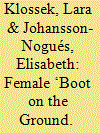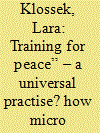| Srl | Item |
| 1 |
ID:
179550


|
|
|
|
|
| Summary/Abstract |
The Indian government has presented itself as a champion of gender mainstreaming in UN peacekeeping. At the same time, the domestic security sector in India continues to create a gender-segregated environment and experiences of uniformed women in the field show remaining barriers for gender equity. Given this contradiction, the article examines the ambivalence inherent to Indian gender mainstreaming of peacekeeping units. We argue that transnational norms, such as gender mainstreaming, are embedded in larger norm bundles, and we combine the literature of norm localization and norm contestation in our conceptual framework to illustrate how India localizes parts of the gender mainstreaming norm bundle whilst contesting others. We find that India’s localization of the gender mainstreaming norm has meant to pursue an asymmetric gender-parity approach between different branches of the Indian security forces and that it has fomented a division of labour within the police corps. Moreover, we illustrate how India contests the idea of placing women in security-sensitive areas, in combat roles, and gender-integrated police units.
|
|
|
|
|
|
|
|
|
|
|
|
|
|
|
|
| 2 |
ID:
175459


|
|
|
|
|
| Summary/Abstract |
Why have the EU and India been unable to explore the common potential of their partnership in peacekeeping training? Drawing upon the literature of practice theories and the concept of community of practices, as well as semi-structured interviews with policy-makers and peacekeeping trainers from India and the EU, policy documents and participant observation, the article explores the complementarity of structures of the EU’s and India’s training communities and discusses the implicit knowledge which is guiding the practices of actors. Thereby, the article moves away from offering structural explanations, such as diverging strategic interests, which have dominated the literature on the EU’s external relations with Asia. Comparing the practice communities, the article finds substantial divergence in the material and ideational structure of training institutes. Moreover, the article illustrates that the disposition of actors in the Indian training community is characterised by the unspoken understanding that India’s training philosophy is more compatible with other countries from the Global South. While both structures, as well as dispositions of actors are unfavourable vis-à-vis an EU–India partnership in peacekeeping training, the article concludes that by addressing familiarity gaps among training communities, divergences in structures and dispositions can be overcome.
|
|
|
|
|
|
|
|
|
|
|
|
|
|
|
|